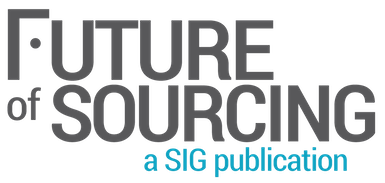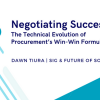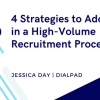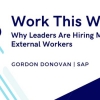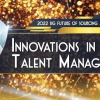The job market is booming – the number of open jobs exceeds the number of Americans who are unemployed. In October, the U.S. Department of Labor reported job growth of 250,000, locking in a 3.7 percent unemployment rate – the lowest since 1969. Due to America’s growing economy, thousands of companies across the country are prospering and looking for strong talent. This makes it a job seeker’s market but leaves organizations in a tight spot since there’s not enough talent to fill demand. It’s a quandary: What is the best way to find employees for the job, as quickly as possible, when they may not exist?
Thankfully, technology is advancing faster than ever and changing the game for the talent supply chain, with one of the biggest disruptors being artificial intelligence (AI). While there’s hesitation from some that emerging technology like AI will threaten jobs, the advancements are actually contributing to job growth. With the power of advanced tools, it is much easier to find new, qualified talent to meet demand and reach candidates with specialized, unique skillsets who might otherwise be hidden from view.
AI: The Game Changer in Workforce Management
AI is especially disruptive for the contingent workforce sector, which includes freelance and contractual work. As an area of talent procurement with its own set of rules, finding the right candidate for specific short-term jobs or “gigs” can be difficult and time consuming. Paperwork overload, team bandwidth issues, process inefficiencies, compliance and regulatory consideration and costs all challenge the talent procurement process. AI is turning this process on its head, making it much more proactive and prescriptive.
Before emerging technologies like AI, we could only use data to understand what happened in the past. Now, analytics have become more predictive and provide educated forecasts to help shape the future and aid in forward-looking, strategic decision-making. According to a Korn Ferry study, 63 percent of talent acquisition professionals say AI and big data have changed the way they recruit, and 69 percent say that using AI as a sourcing tool has garnered higher-quality candidates. To bring in the right candidates, we need easier ways to find, filter, interview and vet candidates – and that’s exactly where AI comes into play.
AI’s Ability to Find the “Perfect” Match
The problem with the labor market today is not that the talent doesn’t exist, it’s that we aren’t using the right tools to find the best candidates. In a tight labor market, the pool of candidates has shrunk. Furthermore, job seekers are using different tactics and resources (such as freelance job boards) to search for jobs, which requires companies to change the way they find and source candidates. While these may be obstacles for employers, today’s modern workforce allows for new growth opportunities. The influx of digital natives expands the geographic pool to employees who can work remotely from anywhere in the world. AI has the power to find these employees who were once considered nonexistent and go beyond a candidate’s résumé to determine if they are the right person for the job.
For example, AI is now empowering hiring managers to make smarter and faster hiring decisions by using “match” algorithms to find the most qualified candidate(s) on a variety of hard and soft skills. So, what does this mean? HR managers can now prioritize their time reviewing candidates that AI finds, rather than spend countless hours trying to find the right candidates by sorting through all the noise of scrambled résumés and CVs. Not only will they be able to sort through résumés faster, but they’ll find better qualified candidates to interview faster, ultimately having an edge in the race for talent.
Let’s say, hypothetically, a leading tech company is looking for a Senior Network Technician for a year-long project. Because jobs are so specialized and everyone in IT wants to work with this company, even the most qualified of candidates get lost in the sheer volume of applicants and résumés. How can the company find the right person? Using predictive workforce management AI, a candidate’s CV can be converted into a searchable record to leverage semantic search technology and more effectively match the meaning of the candidate's content with the intent of the job requisition. This means that candidate matching can include both fact-based requirements, such as years of experience and education, as well as softer characteristics, such as cultural fit. From this, a percentage match score can be calculated and the top candidates identified and passed on to HR or procurement for human review. Using predictive analytics in this way can save a great deal of time and energy and ultimately improve the overall quality of candidates sent to hiring managers for consideration.
What’s more, AI can eliminate much of the tedious work that HR managers do and free up time for them to interpret and act on the insights it reveals. By helping employers quickly analyze and interpret data to identify top candidates, AI gives hiring managers and procurement leaders time back to focus on more strategic work – like implementing employee engagement initiatives and ensuring that onboarding and training for new hires is effective.
What Does the Future Hold?
The future is bright for workforce management, with AI poised at the beginning of what’s to come. By using AI to drive the workforce management process, companies can get more work done and focus their time on pressing issues to drive bottom-line results and ultimately position the company for success. With technology advancing faster than ever before, AI is already changing the way workforce management is executed and organized.
In the grand scheme of things, everyone wants the best talent they can find…but they also want an easy and efficient way to find them, especially in today’s tight labor market. With the use of sophisticated technology, such as AI, your organization can have an advantage in procuring truly qualified candidates to further advance your business objectives.
Region:

